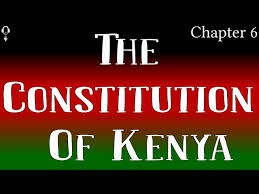
Chapter 6 of the Constitution of Kenya is a crucial part of the country’s supreme law.
It covers several critical aspects related to leadership and integrity in public service.
This chapter sets the standards for ethical conduct and accountability for public officials, ensuring that those entrusted with leadership roles serve the public interest with integrity and honesty.
Let’s delve into the key provisions of Chapter 6 and what they mean for Kenya’s governance.
1. Leadership and Integrity
Chapter 6 emphasizes the importance of leadership with integrity.
It requires that all state officers, including the President, Deputy President, Cabinet Secretaries, Members of Parliament, and other public officers, adhere to the highest standards of integrity, competence, and diligence.
It also establishes the Leadership and Integrity Act, which provides further guidance on the conduct of state officers and public officers.
2. Qualifications for Leadership Roles
To hold a state office, a person must meet certain qualifications, including being a citizen of Kenya, of sound mind, and not an undischarged bankrupt.
The chapter also outlines grounds for disqualification, such as a conviction for an offense involving dishonesty, among others.
3. Responsibilities of State Officers
State officers are expected to uphold the Constitution and the law, and to serve the people of Kenya diligently and with honesty and integrity.
They are required to declare their wealth and assets before taking office and annually thereafter, to ensure transparency and accountability.
4. Codes of Conduct
Chapter 6 provides for the establishment of codes of conduct for state officers and public officers, which set out the standards of behavior expected of them.
These codes of conduct are aimed at promoting ethical conduct and preventing corruption in public service.
5. Accountability and Discipline
The chapter provides for mechanisms to ensure accountability and discipline among state officers and public officers.
It establishes bodies such as the Ethics and Anti-Corruption Commission (EACC) and the Public Service Commission (PSC) to investigate and take action against officers who breach the code of conduct.
6. Enforcement and Penalties
Chapter 6 empowers the EACC and other relevant bodies to enforce the provisions of the chapter.
It also sets out penalties for violations, including removal from office, fines, and imprisonment, to deter misconduct and corruption.
7. Impact on Governance
Chapter 6 has had a significant impact on governance in Kenya, promoting transparency, accountability, and ethical conduct among public officials.
It has helped to build public trust in government institutions and has contributed to the fight against corruption.
Conclusion
In conclusion, Chapter 6 of the Constitution of Kenya is a critical component of the country’s governance framework.
It sets the standards for ethical conduct and accountability among public officials, ensuring that those in leadership roles serve the public interest with integrity and honesty.
By upholding the principles outlined in Chapter 6, Kenya can continue on its path towards good governance and development.

FAQs About Chapter 6 of the Constitution of Kenya
1. What is Chapter 6 of the Constitution of Kenya?
Chapter 6 of the Constitution of Kenya sets out the standards for leadership and integrity in public service.
It establishes the principles of ethical conduct and accountability for state officers and public officers.
2. Who does Chapter 6 apply to?
Chapter 6 applies to all state officers, including the President, Deputy President, Cabinet Secretaries, Members of Parliament, and other public officers. It sets the standards of behavior expected of them in their official capacity.
3. What are the key provisions of Chapter 6?
- It requires state officers to adhere to the highest standards of integrity, competence, and diligence.
- It establishes qualifications and disqualifications for holding state office.
- It mandates the declaration of wealth and assets by state officers before taking office and annually thereafter.
- It provides for the establishment of codes of conduct for state officers and public officers.
- It establishes mechanisms for accountability and discipline, including the Ethics and Anti-Corruption Commission (EACC) and the Public Service Commission (PSC).
- It empowers relevant bodies to enforce the provisions of the chapter and sets out penalties for violations.
4. How has Chapter 6 impacted governance in Kenya?
Chapter 6 has had a positive impact on governance in Kenya by promoting transparency, accountability, and ethical conduct among public officials.
It has helped to build public trust in government institutions and has contributed to the fight against corruption.
5. What are the consequences of violating Chapter 6?
Violations of Chapter 6 can result in serious consequences, including removal from office, fines, and imprisonment.
The specific penalties depend on the nature and severity of the violation.
6. Can Chapter 6 be amended?
Yes, Chapter 6 can be amended through the formal amendment process outlined in the Constitution of Kenya.
However, any amendments must uphold the principles of leadership and integrity set out in the chapter.
7. How can citizens ensure that Chapter 6 is upheld?
Citizens can ensure that Chapter 6 is upheld by holding public officials accountable, reporting any violations to the relevant authorities, and actively participating in the governance process through elections and public participation forums.
Related Content
Mr. Weldon Kosgei, a dedicated educator with the Teachers Service Commission (TSC) in Kenya, brings years of experience and a deep love for education to his role at TSCNewsToday.co.ke. He provides insightful and timely updates on TSC policies, educational trends, and best practices, making his articles valuable resources for educators and administrators. Mr. Kosgei’s commitment to enhancing education shines through in his writing, connecting and inspiring the teaching community across Kenya.










